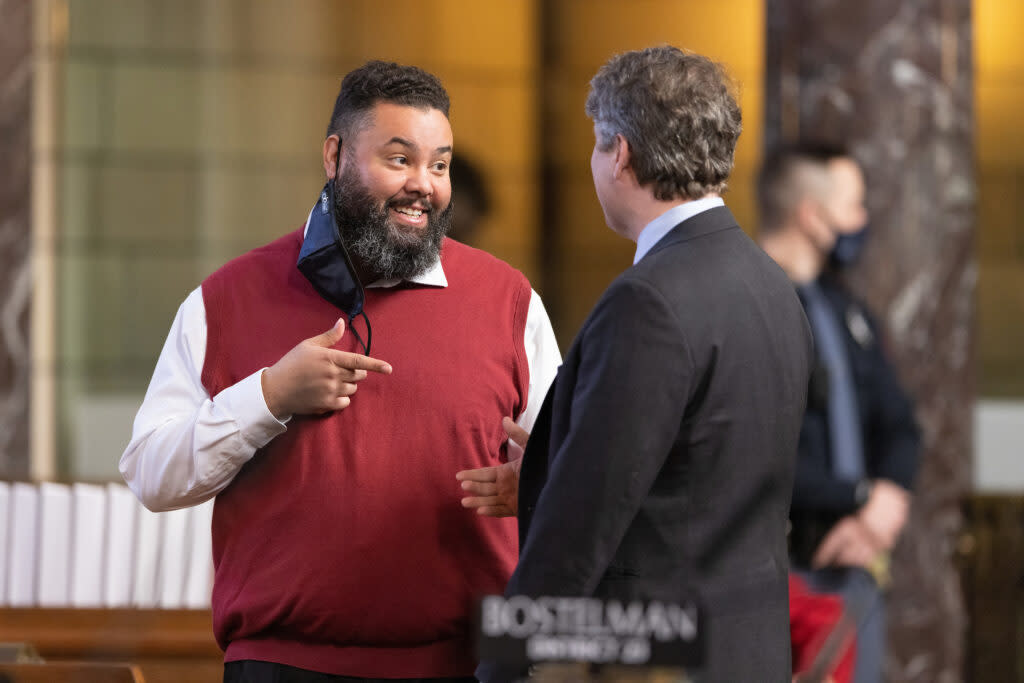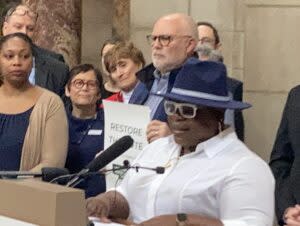Felon voting rights restoration proposal becomes law but faces possible legal challenge

- Oops!Something went wrong.Please try again later.
Sens. Justin Wayne, left, and Mike Hilgers chat on the floor of the Nebraska Legislature at the Nebraska Capitol Building on Tuesday, Jan. 18, 2022, in Lincoln. (Rebecca S. Gratz for the Nebraska Examiner)
LINCOLN — A legislative proposal to immediately restore voting rights to Nebraskans convicted of a felony once they’ve completed their sentence has become law but faces a likely legal challenge.
Demetrius Gatson said that despite completing her felony sentence, getting a job and buying a home, she had to wait two years before getting to vote again, which she called “taxation without representation.” Jan. 20, 2023. (Paul Hammel/Nebraska Examiner)
Gov. Jim Pillen on Wednesday declined to sign Legislative Bill 20 or its accompanying appropriation bill, from State Sen. Justin Wayne of Omaha, but allowed it to become law. In a letter to the Legislature, Pillen said both Attorney General Mike Hilgers and Secretary of State Bob Evnen “identified significant potential constitutional infirmities regarding the bill.”
“Although there are potential constitutional issues with LB 20 and related provisions of existing law, I will allow LB 20 and LB 20A to become law with neither my signature nor my endorsement of LB 20’s constitutional validity,” Pillen wrote.
The Nebraska Constitution allows bills to become law without the governor’s signature five days after they are passed by the Legislature, as long as lawmakers are still in session.
Pillen encouraged Hilgers and Evnen to “promptly” take appropriate future steps, which could include legal action, “in light of the constitutional infirmities.” Neither office had immediate comment on Pillen’s letter or whether they would take legal action.
Barring any legal hoops, LB 20 will take effect this summer in time for the November election.
Lawmakers sent 101 other proposals to Pillen last week and he signed every one.
‘All faith’ in constitutionality
Nebraska Attorney General Mike Hilgers. June 30, 2023. (Zach Wendling/Nebraska Examiner)
Legislature Clerk Brandon Metzler said the last time a governor allowed a bill to become law without signing it (vetoes excluded) was in 2001. Former Gov. Mike Johanns did so, he wrote at the time, because the law in question pertained to a legislative employment benefit decision related “solely to its employees.”
Johanns did not list major concerns, as Pillen did with LB 20.
Wayne said he does not have constitutional concerns with his bill, which he introduced multiple times during his eight-year tenure, and said he looks forward to the Nebraska Supreme Court deciding the matter.
“If it is a court challenge, I have all faith that the Supreme Court will hold this to be constitutional,” Wayne told the Nebraska Examiner on Thursday.
Past judicial, legislative action
Secretary of State Bob Evnen, at right, looks on as State Sen. Fred Meyer of St. Paul signs official paperwork for his appointment to the Nebraska Legislature. Nov. 15, 2023, in Lincoln. (Zach Wendling/Nebraska Examiner)
In 2002, the Nebraska Supreme Court in John Ways v. Dave Shively, considered restoring voting rights to Nebraska and wrote, “Restoration of the right to vote is implemented through statute.”
Three years later, lawmakers passed the current law that allows voting rights to be restored two years after Nebraskans complete their felony sentence or associated probation.
Former Gov. Dave Heineman vetoed that proposal, saying it was in the best interest of Nebraska’s citizens to continue to let the Nebraska Board of Pardons decide on a case-by-case basis whether to restore voting rights. He added that the board was looking at the time to administratively “abbreviate” the restoration process.
“The Nebraska Board of Pardons reviews a felon’s request for his or her voting right to be restored by carefully weighing the nature and degree of the felon’s crime or crimes, his or her behavior following release from prison, and the interests of the felon’s victims,” Heineman wrote.
The governor, secretary of state and attorney general comprise the Pardons Board, and Wayne said if it’s a good policy, then the board should take action and more often restore voting rights.
Nebraska Gov. Jim Pillen. Dec. 27, 2023. (Zach Wendling/Nebraska Examiner)
Lawmakers in 2005 ultimately voted 36-11 to override Heineman’s veto of the proposal from former Lincoln State Sen. DiAnna Schimek.
Pillen similarly pointed to the separation of powers between branches of government and the powers of the Board of Pardons and Board of Parole.
‘Fundamental principle of redemption’
With LB 20 becoming law, Nebraska’s Voting Rights Restoration Coalition said Thursday that “today is a great day for fairness in Nebraska” and encouraged Nebraskans whose voting rights could be restored in time for November’s general election to go to GetMyVoteBack.org for more information.
The coalition added that Nebraska’s leaders “upheld the fundamental principle of redemption by recognizing every person’s inherent dignity and worth, regardless of past mistakes.”
“Today, Nebraska took a significant step toward a more just, inclusive and participatory democracy,” the coalition said in a statement. “Nebraskans believe in second chances, and that’s what this bill is all about.”
The Nebraska Voting Rights Restoration Coalition includes:
ACLU of Nebraska.
Black Men United.
Black Votes Matter.
Civic Nebraska.
Common Cause Nebraska.
Las Voces.
League of Women Voters of Nebraska.
NAACP.
Nebraska Appleseed.
Nebraska Civic Engagement Table.
Nebraskans for Peace.
Represent Us Omaha.
RISE.
Stand in For Nebraska.
The Sentencing Project.
The post Felon voting rights restoration proposal becomes law but faces possible legal challenge appeared first on Nebraska Examiner.





